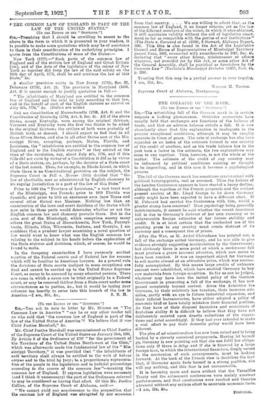THE COLLAPSE OF THE MARK.
[To THE EDITOR OF THE " SPECTATOR ")
SIR,—Tho astonishing fall of the German mark is in certain respects a baffling phenomenon. Orthodox economists have usually held that exchanges are functions of the balance of trade, and that an adverse balance entails a fall. It is now abundantly clear that this explanation is inadequate in the present exceptional conditions, although it may be roughly accurate in times of peace. The rate of exchange has also been regarded as an index of the estimate formed in one country of the credit of another, and as the trade balance has in the past been a factor in the estimate, the two explanations may seem to run together. This, however, is not the whole of the matter. The estimate of the credit of any country may be influenced by political conditions existing or thought to be impending, and in this case it becomes a psychological process.
The fall of the German mark has sometimes synchronized with political turning-points, real or assumed. Thus the failure of the London Conference appears to have started a heavy decline, although the rejection of the French proposals and the evident present anxiety of Mr. Lloyd George to let down Germany easily might have been expected to have a different effect. if M. Poincard had carried the Conference with him, would a greater slump have occurred? Mass psychology being generally indeterminate, it cannot be said whether the recent disastrous fall is due to Germany's distrust of her own currency or to unfavourable foreign estimates of her future stability and credit. It is at least certain that the unchecked use of the printing press in any country must create distrust of its currency and a consequent rise of prices.
After the War, as M. Ands() Chdradame has pointed out, a fall of the exchange suited Germany, and lie was able to give evidence strongly suggesting manipulation by the Government; but obviously there is some point at which a continuous fall must produce a grave internal situation, which now seems to have been reached. it was an important object for Germany to sell marks abroad at an attractive price, which was success- fully accomplished. By this means large credits of unknown amount were established, which have enabled Germany to buy raw materials from foreign countries. So far as can be judged, whatever may have been the initial policy of the German Government in promoting a fall of the exchange, it has now passed completely beyond control. Since the Armistice the Germans, by their relatively low taxation, their immense sub- sidies, partly with an eye to future industrial expansion, and their inflated bureaucracies, have either adopted a policy of economic bluff or have totally mistaken their financial position. As they have at their disposal financiers and economists of first-class ability it is difficult to believe that they have not deliberately counted upon drastic reductions of the repara- tions and acted accordinglif. If they had ever intended to make a real effort to pay their domestio policy would have been different.
The plea of ad misericordiam has now been raised and is being backed by a cleverly conceived propaganda. Having let herself go, Germany is now pointing out that she can fulfil her obliga- tions only if there is deley and if she is financed by a large foreign loan, to which the international financiers, deeply versed in the mechanism of such arrangements, must be looking forward. At the back of the French view is doubtless the fear that, if Germany again finds herself in a strong position, she will pay nothing, and this fear is not unreasonable.
It is becoming more and more evident that the Versailles Treaty and the subsequent conferences were mainly amateur performances, and that conclusions were reached and theorise advanced without any serious effort to ascertain economic facts. —I am, Sir, &c.,,
YDEs. It AM


































 Previous page
Previous page